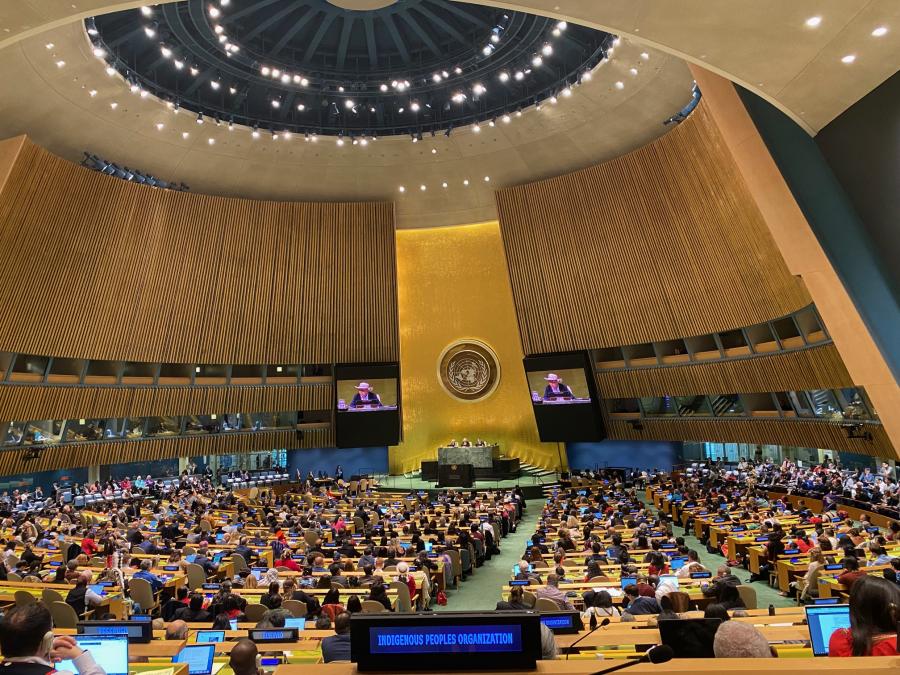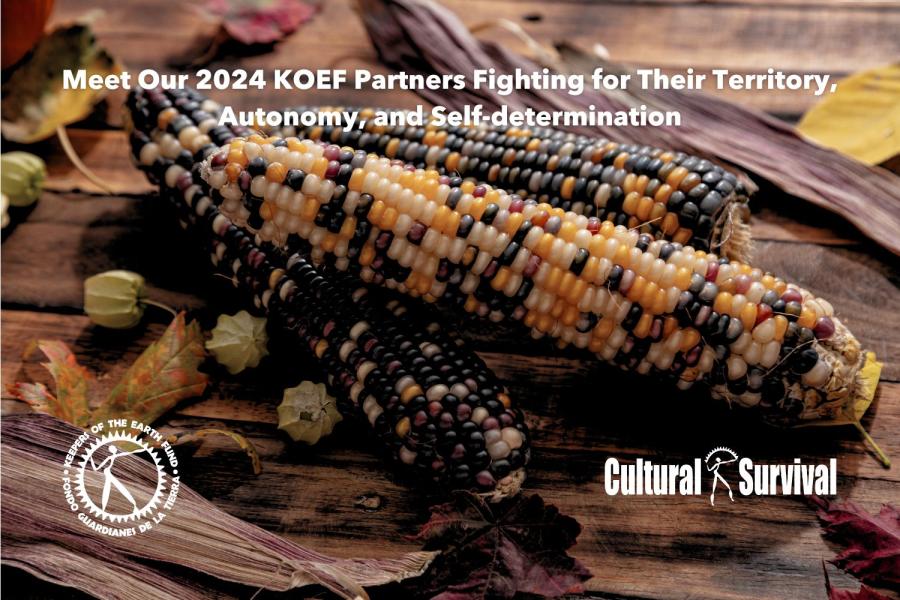Content Note: The following includes disturbing information on violence against Indigenous Peoples. We have strived to provide information on each individual, in celebration of their lives and work, without gratuitous detail on their deaths. While we have worked to avoid linking to sources with graphic imagery, please note that the sources linked may contain further details and images may be changed by websites after we have reviewed them.
Latin America is one of the most dangerous regions to be an Indigenous rights and environmental defender. Three out of four assassinations of environmental defenders take place in Latin America. Indigenous defenders face a double threat: defending rights and being Indigenous. In 2021, roughly 40 percent of murdered environmental defenders were Indigenous, a disproportionately high figure given that Indigenous Peoples comprise roughly 6 percent of the global population.
As part of our Advocacy Program, Cultural Survival tracks violence against Indigenous defenders in an effort to draw connections amongst these cases and demonstrate that this crisis, rather than being a set of unconnected attacks on individual people, is systemic.
We do this work in order to raise awareness about this systemic persecution of Indigenous defenders, but also for the sake of memory. The Indigenous defenders who were killed throughout 2023 will never be forgotten by their families and communities. The gap they leave in their communities and cultures cannot be filled, and this gap is equally important outside of their communities: these defenders are the people defending our planet from environmental collapse and keeping alive critical knowledge on how to protect our ecosystems and how to relate to one another.
Sometimes the news of murder or attacks on Indigenous people spreads in specific communities and territories, where the pain and loss is felt profoundly, but it does not always echo in mainstream media. Cultural Survival’s compilation of cases is not exhaustive. Our information comes both from other media and from communities and partner organizations. However, we cannot cover the full scope, and there are certainly cases that do not reach us. Although those people are not specifically named in this In Memoriam, this in no way implies less severity or importance. This work also aims to honor all those, who, for a variety of reasons, we could not mention, and whose struggles will continue to resonate in their communities, their territories, and their families.
The ways in which we receive information about these cases varies. In some cases there are plenty of news articles and calls for justice. In other cases, information is extremely scarce or even just a brief message or press release passed to us by a partner on the ground. Our purpose is to make all names and legacies known, regardless of how much attention the case received, especially uplifting those less covered by the media. When we were informed of otherwise unpublished cases by community partners, we ensured that it was safe to publish, always obtaining the community’s consent. Every individual was a beloved person, a community and family member, and someone who is mourned for not only the work they did but for who they were.
For most cases, a few months after the murder, impunity reigns. In some Latin American countries, the general impunity rate is 90 percent or more, meaning 10 crimes (or fewer) out of 100 are properly investigated and solved by the justice system. These figures are optimistic in comparison to crimes against Indigenous defenders. Authorities tend to not put much effort into thorough investigations related to Indigenous defenders for a variety of reasons: incidents take place in remote locations with limited access, collusion of authorities with illegal armed actors or multinational companies, and a general lack of interest in problems concerning Indigenous Peoples intrinsic to State discrimination towards them. Mary Lawlor, Special Rapporteur on the situation of human rights defenders, has said that impunity for killings is a key driver for more murders.
In the profiles below, we remember and mourn 77 Indigenous people who were killed in 2023. We also recognize and condemn attacks, disappearances, criminalization, and other forms of violence committed against Indigenous defenders worldwide. We acknowledge that our scope is limited and that violence against Indigenous Peoples and against particular defenders of rights and the environment far surpasses the data that we were able to collect, and we honor all of the Peoples and communities who have been affected. We commit to continuing to work towards justice for Indigenous land and rights defenders alongside the affected communities to the extent that we are able. Defenders are listed by country in alphabetical order, then chronologically by date of the incident.
Brazil
For further information check the Story Map on Indigenous land defenders and regions Cultural Survival published together with University of California Network for Human Rights and Digital Fact-finding.
-
Nawir Brito de Jesus and Samuel Cristiano de Amor Divino
-

Photo via Mongabay
Two Pataxó leaders, Nawir Brito de Jesus (17) and Samuel Cristiano de Amor Divino (25) were brutally murdered on January 17, 2023. This incident took place in the municipality of Itabela, Southern Bahia state. According to a witness, Nawir and Samuel were returning to a reclaimed (retomada*) farm and they were shot dead by a gunman on a motorcycle. The farm is located in the Barra Velha Indigenous Territory and the area was recognized as traditionally occupied by the Pataxó people in 2008. However, the land hasn’t yet been fully demarcated. The Pataxó People have faced enormous conflicts with the local ranchers to protect their lands, including a situation in June 2022 when 180 members of the Pataxó community took over another area in the same region that was used for cattle ranching and producing pulpwood trees. Since then, the government has undertaken a series of raids to catch the illegal land loggers and ranchers in the Amazon rainforest to halt deforestation.
*Retomada: the reclaiming of traditional Indigenous land and culture by the younger Indigenous generations. They seek to collect their elders’ knowledge in order to reconnect with their history and culture, reaffirming their identity and avoiding disappearance.
- José Inácio Guajajara
-
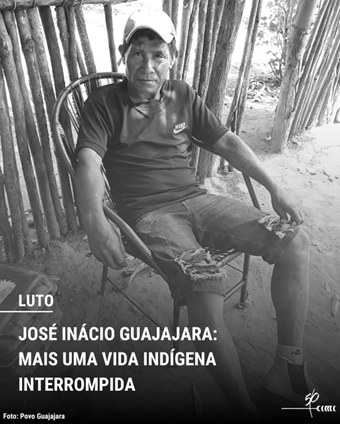
Photo via CIMI’s twitter
José Inácio Guajajara, who was 46 years old, was found without any signs of life on January 25, 2023 by the side of the BR-226 highway, near the Indigenous land of Cana Brava, in Aldeia Jurema, Maranhão. According to the Indigenous Missionary Council (CIMI), his body was found with marks of violence. The suspicion is that Guajajara's life was taken by gunfire on the night of January 24. The Civil Police changed their position on the case, first saying he was found with marks of being shot and then saying that according to the Forensic Medical Institute of Imperatriz (MA), he died by natural causes. An official communication on January 25 announced that if the Civil Police, after hearing the testimony of the family and witnesses, determined that the case was a homicide related to Indigenous rights, the investigation would be carried out by the Federal Police. However, no subsequent announcements were found regarding the final decision.
José Inácio's murder came a day after a meeting between the Human Rights Commission of the Brazilian Bar Association (OAB) and leaders of the Araribóia Indigenous Land. During this technical visit, the commission met with 47 chiefs, who reported violence and threats against the Guajajara people during the past year. - Valdemar Marciano Guajajara
-
Valdemar Marciano Guajajara, who resided in the Nova Viana village, was found dead on January 28, 2023, in the city of Amarante do Maranhão, a municipality which overlaps the Arariboia Indigenous land where he lived. He was found with signs of having been violently beaten, and according to the Indigenous Missionary Council (CIMI), there continues to be an increase in violence against the Guajajara Indigenous People, with Valdemar’s murder being the second death of a Guajajara Indigenous person in a single week.
The Maranhão reserves have been attacked by illegal land buyers and loggers for several years now. Different Indigenous Peoples, including the Guajajara, share the Araribóia Indigenous Territory where conflict and violence has increased, and Indigenous communities are under constant threat due to disputes over the land.
The Minister of Indigenous Peoples of Brazil, Sônia Guajajara, has demanded that those responsible for these acts of violence toward the Guajajara People be held responsible and punished. - Jone Canaré Guajajara
-
On February 23, 2023, in the Arariboia Indigenous Land in Maranhão, Jone Canaré Guajajara, son of Chief Tomazinho Guajajara, was murdered. Two armed men entered Toarizinho village around 7 pm, firing at Jone and another resident. Both were in serious condition when they were brought to a nearby hospital, where Jone later died.
The Indigenous Missionary Council (CIMI) reported the incident and highlighted the escalating violence in the region. The area, home to Guajajara and Awá people, faces chronic attacks from loggers and hunters. Recent cases reveal a failure in investigations. Between 2003 and 2021, 50 murders of Guajajara people in Maranhão were recorded, with 21 in the Arariboia region. - Ilson Xiriana and Venâncio Xirixana
-
Ilson Xiriana (also spelled Xirixana), 36, was a Yanomami health agent and a beloved member of his community. On April 29, 2023, while participating in a funeral ceremony in the Uxiu community, he was shot. He died before he could be taken to a hospital. Two other Yanomami, Venâncio Xirixana and Otoniel Xirixana, were also shot and seriously injured. Information has not been available on Otoniel’s progress, but Venâncio died in the hospital on August 20 as a result of the injuries he sustained in the April attack.
Because of the weapons used, community leaders believe that those responsible for the attack belong to a criminal group linked to drug traffic called First Capital Command (PCC), which has been attracted to the region by garimpo, or illegal gold mining. The leaders also claim that the miners have polluted rivers with mercury, destroyed the jungle, abused and killed members of their community, and created a food and humanitarian crisis.
This attack is part of a long-running conflict on Yanomami land in the state of Roraima, caused by the expansion of garimpo and government negligence. The attack on Uxiu came three months after the launch of a federal operation to eradicate illegal mining. According to the Brazilian Ministry of the Environment, the operation had, to date, destroyed hundreds of mining camps, as well as several vehicles and engines. During the week of Xiriana’s attack, at least another 14 people were killed by the illegal miners in retaliation against the government’s operation.
Colombia
Context in Cauca
In the midst of this severe humanitarian crisis in northern Cauca, the Association of Indigenous Councils of North Cauca (ACIN) published its 2022 report, "Territorial Disharmonies," emphasizing that the armed conflict aims to destroy territorial autonomy and exploit natural resources. The report cites alarming figures, including the recruitment of 250 children in 2022, 97 homicides, 88 threats, and various other forms of violence. The conflict is linked to strategic positions for drug trafficking, particularly involving the National Liberation Army (ELN) and FARC dissidents. Recent events, such as the death of William Vargas and the recruitment and killing of Murui Indigenous children, highlight the ongoing crisis. The Ombudsman and President Gustavo Petro condemned these acts, with Petro suspending the bilateral ceasefire with the FARC dissidents. The situation extends beyond Cauca, with a critical risk to social and human rights leaders across Colombia, recording 593 homicides between September 2019 and December 2022. The Ombudsman emphasizes the need to protect individuals in communal, Indigenous, community, peasant, agrarian, and Afro-descendant sectors, which account for 79% of the total homicides.
- José Taicus Pascal
-
José Taicus Pascal (Awá) was 16 years old when he was murdered January 2, 2023, in Tumaco, Colombia. He was with his family when three armed men arrived at the Alto Albi Reservation and shot José. His brother, Javier Taicus Canticus, member of the Indigenous Guard, was also hit and suffered serious injuries.
The Organization of Indigenous Reservations of the Awà People of the Pacific (ORIPAP) urged armed groups to establish dialogues and create a lasting and stable development of peace for Awá communities. José is remembered for fighting hard to protect his People and stood up against the use of sacred territories as battlefields. - Berna Nastascuas Pai
-
Berna Nastascuas Pai (Awá) was a member of the Indigenous Guard in the Sabaleta Sábalo community in the Tumaco district. Berna was 30 years old. He was accompanying his wife and brother-in-law on their way home when an anti-personnel mine went off and Berna died on January 29, 2023.
The illegal occupation of the Awá territories by armed actors has led to the planting of anti-personnel mines that put the Indigenous communities at high risk. Not only is their physical safety endangered, but mines restrict their use of traditional spaces for hunting and fishing and sacred sites for healing and ceremony. Even cemeteries within the territory have been harmed. Additionally, access to educational institutions for many children has been restricted, because of the presence of mines in their schools, athletic fields, and surrounding roads. Five cases of anti-personnel mines detonating were registered in Awá lands in 2022 alone.
Berna fought for harmony on his territory and protection of ancestral knowledge of the Awá worldview, and he worked to increase autonomy, food sovereignty, and the protection of his community’s safety. - Marcos López Enríquez
-
Marcos López Enríquez was traveling to Ipiales to participate in the Permanent Working Table for the Pasto and Quillasingas Indigenous Peoples on February 11, 2023, when he was approached by a group of armed men. The perpetrators shot Marcos in the head and, despite being rushed to the hospital, he died.
Marcos was the representative of the Movement of Indigenous Authorities of Colombia, the governor of the Resguardo Gran Mallama (Awá), and councilor of the municipality of Mallama. His murder is emblematic of the humanitarian emergency Indigenous Peoples in the south of Colombia face. The vice president of Colombia, Francia Márquez, denounced the crime, saying, “We will not allow them to continue to snatch us from those who add to peace.”
The Colombian police force detained Víctor Hugo Garrido and charged him with aggravated homicide and illegal carrying of firearms. Four people have been detained in total and the police reported them to be part of the National Liberation Army (ELN), a guerrilla group active in that area. - Marlon Hernando García Pascal
-
Marlon Hernando García Pascal (Awá) was 19 years old and was an active member of the Indigenous Guard in El Gran Sábalo reservation in the department of Nariño. According to the Indigenous Unit of the Awá People (UNIPA), he was killed by illegally armed actors while he was at home on March 3, 2023.
Colombian authorities had warned about the imminent risk for Indigenous leaders when they exercise their sovereignty. Community members are continuously threatened by illegal armed actors if they participate in activities on their traditional lands or engage in rights’ movements. Ten people have been killed on the Awá reservation El Gran Sábalo since 2022. - Wilson Bomba Piamba
-
Wilson Bomba Piamba was 31 years old and was a Nasa leader and councilor of Caldono, Cauca. On March 15, 2023, he was shot by an unidentified group in a vehicle. During the attack, another Indigenous person named Julio César Peña was also injured.
The municipality of Caldono is in a precarious situation, where different armed groups such as Dagoberto Ramos and the ELN fight for control over the territory. On Wednesday, March 15th, 2023 a cross-fire started and left several civilians trapped in the middle. During this time, Jader Chilo, a member of the Pioyá Indigenous Guard, was kidnapped by the armed group Dagoberto Ramos. Sa’th Tama Kiwe authorities write that “as long as this conflict lasts, the ideal of the fundamental right to life, enshrined in the political constitution of our nation, will remain elusive. We insist on a dialogue, [and a] structural and lasting solution to the armed conflict.” - Albert Camilo Mendoza Corzo
-
Albert Camilo Mendoza Corzo (Kankuamo) was 56 years old and was a farmer and prosecutor of the local council of elderly of the Community of Kankuamos of Valledupar. According to the local community, Albert was working on his farm on March 21, 2023, when someone approached him and threw a stone at his head. The perpetrator then fled the scene and Albert was left to die.
Prior to his murder, warnings had been issued about the safety of Indigenous communities in the region. The Ombudsman’s Office expressed continuous concern about the human rights abuses against members of the community. Several violent crimes had been committed; Kankurwas (sacred houses or temples) have been threatened with incineration; and illegal armed groups have spread pamphlets with threats against the Indigenous communities. - Diego Jair Orbes
-
Early in the morning of Tuesday, March 21, 2023, armed individuals tragically took the life of Diego Jair Orbes. This occurred in the Jerusalén community in the San Pedro Arizona corridor of Puerto Caicedo.
Diego Jair Orbes (Nasa) was 32 years old and was the father of two children. He was an active member of the Nasa community and held the position of prosecutor in the Jerusalén community's action board. There are several illegal armed groups that are fighting for control over the region. The Indigenous communities have voiced concerns about these armed groups and pleaded for peace and security in their land. - Marleny Güegüe
-
The midwife Marleny Güegüe was murdered on March 17, 2023 in the municipality of Miranda. There is no more public information available about her.
- José Isaías Quiguanás
-
José Isaías Quiguanás (Nasa) was an Indigenous doctor who was killed on April 18, 2023, near the Indigenous reservation López Adentro. As a keeper of medicinal plant knowledge and healing rituals, his death is a deep loss to his community. With José, cultural and spiritual knowledge of the community was lost, which endangers their survival.
The Association of Indigenous Cabildos of Northern Cauca (ACIN) has denounced 6 other murders in the López Adentro territory in 2023 and urged human rights organizations to be aware of and stand up against the violence against Indigenous leaders.
- Mary Cruz Petro
-
In the morning of April 25, 2023, in Salguero village, rural Ciénaga de Oro, nurse Mary Cruz Petro (Zenú) was tragically attacked and killed by unknown assailants. The Police of Montería expressed regret and sent investigative and support teams to the area. A reward of up to 20 million pesos was announced for information leading to the capture of those responsible.
The incident occurred in President Gustavo Petro's hometown, and it adds to the alarming statistics reported by human rights groups, which show that 15 women have been murdered in Córdoba up until April 2023.
- William Vargas
-
In 2023, the North of Cauca region in Colombia, a historical center of armed conflict, experienced escalating violence. On May 3, the National Liberation Army (ELN in Spanish) and the Revolutionary Armed Forces of Colombia (FARC in Spanish) clashed and violence broke out. One of the victims was Nasa guard William Vargas. Many pleaded for a ceasefire to protect civilians, but the violence continued for over 48 hours. Forty-three Indigenous children were trapped and had to endure pain and trauma, until a joint mission by several international, national and local entities eventually rescued them.
Indigenous authorities and social organizations report ongoing violence in Cauca, denouncing the forced recruitment and killing of Indigenous children. The Ombudsman urged armed groups to spare civilians, particularly children. Indigenous leaders stress that such incidents, though garnering temporary attention, represent the daily reality of persistent violence in their territory.
The State's response is criticized by Human Rights organizations for being inadequate and not coordinated with Indigenous authorities, leading to internal displacement and educational disruptions. The community requested support at the international level, calling on to the United Nations and the Mission to Support the Peace Process of the Organization of American States to address the humanitarian emergency.
- Libia Quiguanás and Telésforo Ipia
-
On the night of May 22, 2023, Libia Quiguanás Casso and Telésforo Ipia Medina, a Nasa couple, were kidnapped from their home in the village of La Mina, in the central zone of the Jambaló Indigenous reserve in northern Cauca. They were both found dead two days later by the Indigenous guard, on the banks of the Jambaló River. Libia, 45, was a kiwe thë'j (ancestral wise woman or traditional doctor) in her village.
The Asociación de Cabildos Indígenas del Norte del Cauca (ACIN) claims that these attacks are part of the escalation of the armed conflict that the region has suffered in recent months. However, these attacks against Indigenous holders of ancestral knowledge are not a new phenomenon. The Indigenous leaders state that “The perpetrators of violence have systematically tried to destroy the roots of our spirituality and our cosmovision. We point out to the world the continuity of this cultural extermination and demand effective protection as Nasa people”.
- Marcelino Dagua Baicue y Rosalía Quiguanas Dagua
-
“Mayora” (Elder) Rosalía Quiguanas Dagua, 48, and his husband and ancestral knowledge holder Marcelino Dagua Baicue, 51, from the Nasa Kiwe People were murdered on the night of June 12, 2023, on the Picacho vereda in the Jambaló región, in Cauca.
The Kwekwe Nej Wesx ancestral authorities of the Sat Tama Kiwe territory of Jambaló issued a statement that conveys the following: “To end the life of an ancestral wise man or woman represents genocide for the Nasa people of Jambaló. With these acts they uproot the life of a People that with all their strength resists to disappear, destabilising the harmony and balance from the law of origin and natural law, bursting into the cosmovision from the deepest part of the Nasa being.”
The Regional Indigenous Council of Cauca - CRIC denounces that this case is not in any case isolated, and that “the crisis caused by armed groups, the imposition of crops for illicit use and other legal and illegal economies give no respite to life.”
- Alexander Chocué Peña
-
On June 19, 2023, Alexander Chocué Peña (Nasa), part of the Indigenous Ancestral Guard, was shot and killed by a group of armed men in the village La Buitrera, around 1am, in the Caldono municipality, in Cauca. Another Indigenous guard, Jhon Jairo Velasco, was severely injured in the attack and was brought to a medical center.
In addition to being an Indigenous guard, Alexander Chocué was a Minor Sheriff of the council: he was active as a protector of the land against the groups that, for many years and even after the Peace Accords were signed in 2016, are trying to dispossess Indigenous Peoples of their territories in order to make space for illegal coca cultivation. Chocué had already denounced threats received from the Jaime Martínez group (part of the FARC dissidents) in August 2022. The high level of impunity and the long-lasting tensions in the area facilitate these crimes. This is echoed by Mauricio Capaz, major counselor of the Regional Indigenous Council of the Cauca (CRIC), who states, “It is from the inactivity of the Prosecutor’s office that the level of violence rises and that events like this one can still happen with impunity.”It is even more shocking, looking at the history of the violence in the region, to note how threats and acts of violence against Indigenous defenders have become almost an everyday occurrence. The same Chocuè had been previously threatened by some groups active in the Cauca and Nariño regions, and Sandra Liliana Peña Chocue, another Nasa leader, was killed in 2021. The Cauca region is indeed characterized by ongoing conflicts between different actors that aim at controlling the coca plantations located on Indigenous land. The local resistance has resiliently stood the ground against the invaders, trying repeatedly to push them off the land, being, as a result, targeted by the violence.
- José Hernán Tenorio Mestizo
-
José Hernán Tenorio Mestizo, a young, Cauca-based social activist belonging to the Avelino UI Indigenous Association and the Juventud Rebelde Cauca (Cauca Rebel Youth), was shot dead by an armed assailant on July 4, 2023, at around 8pm. The murder took place in the Rio Isabelilla field in the municipality of Toribío, northern Cauca. José was at a fair with his family and was approached by three unknown people when he left to get something to eat. One of them shot him, killing him then and there. On the same day, another leader was killed in the same place.
- Albán Mestizo Yosando
-
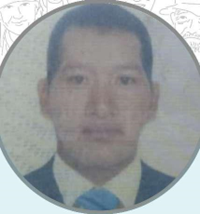
Photo Source: INDEPAZ via X
Albán Mestizo Yosando, an activist from the Nasa People, was brutally killed in Caloto, Cauca, on July 4, 2023. As the legal representative of the Avelino Ul Indigenous Association, Albán had sought security measures from the National Protection Unit, the government agency tasked with ensuring the safety of vulnerable individuals and organizations, upon facing escalating threats in recent months. Unfortunately, his requests for protection were not fulfilled.
This assassination took place when he was passing through the rural town of El Palo in Caloto. At that juncture, armed individuals intercepted him and subsequently opened fire. Despite having reported the threats to the Prosecutor's Office and other entities, the victim's pleas for attention had gone unanswered, as highlighted by members of the Cauca Indigenous Regional Council (CRIC).
- Jhonis Orfelio García
-
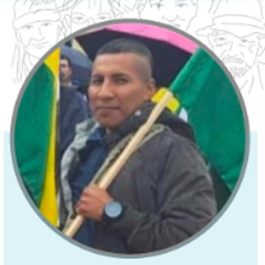
Photo source: INDEPAZ vía X
Jhonis Orfelio García, member of the Awá people, was governor and part of the Guard of the El Palmar reservation in Ricaurte, Nariño. He was murdered on July 5, 2023. The Secretary of Government of Nariño, Andrés Zúñiga, stated that this event was a result of clashes between illegal armed groups. However, the perpetrators of this crime were not identified. Subsequently, he revealed that irregularities occurred after Jhonis' death including, for example, the transfer of his body directly to the municipal morgue, which is not aligned with the authorities’ normal process.
It should be noted that various armed groups and local criminal gangs operate in this municipality, such as La Segunda Marquetalia and the National Liberation Army, which prohibit the reporting of events related to human rights violations. For this reason, the Early Alert 045/19 of the Ombudsman's Office warns that human rights defenders are threatened for exposing these cases.
Although Secretary Zúñiga requested the creation of regional security councils after Jhonis’ murder and in response to the violence taking place in the territory, no information was found about the creation of such councils. Consequently, violence persists because of the clashes between armed groups, causing the displacement of more than 400 families. There was no information found on the capture of the criminals related to this act either.
- Hever Gamboa
-
Hever Gamboa was a well-known Afro-Colombian community leader and Lead Guard of the Nonam Dur People, in the area of Citronela, located in the rural region of Buenaventura. He was part of CONPAZCOL, Association of Afro-descendant, Indigenous and Farmer Communities United for Peace-Building in Colombia. He was murdered on July 6, 2023 along with another Afro-Colombian worker. This took place while they were extracting materials from the Dagua River in the Citronela trail. Other people that walked by were detained by the attackers.
The perpetrators presented themselves as members of the Autodefensas Gaitanistas de Colombia (AGC) or as Clan del Golfo, a Neo-paramilitary group also known for its participation in transnational drug trafficking. This is not an isolated violent event since, according to Indepaz, the region is affected by the presence of armed groups such as AGC, Las Shotas, Los Espartanos, ELN, among others. Given this situation, the community has been forced to leave their homeland.
Furthermore, the organizations that comprise CONPAZCOL demanded that the authorities of Colombia “ promote real conditions to participate from the grassroots; to have human, legal and political conditions to hold dialogues at legal, social and political levels with the armed groups that are based in our territories and to whom we request a permanent ceasefire and to stop the multilateral hostilities in order to protect life.”
- Alex Germán García Guanga
-
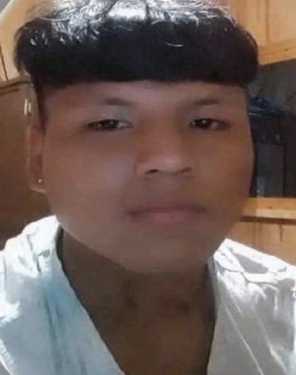
Photo source: INDEPAZ via X
Alex German Garcia Guanga, of the Awá People and just 20 years old, was a member of the Indigenous Guard of the Palmar Imbi Reservation, in the municipality of Ricaurte. He was kidnapped and murdered on July 13, 2023, by an illegal armed group. The Association of Traditional Indigenous Authorities of Awá-Camawari condemned the attack and identified some members of the Nueva Marquetalia group as the responsible parties. They also denounced the constant death threats against Diego Gunga, Coordinator for Human Rights in the region.
The community has requested protection measures from human rights institutions and the national government; nevertheless, the violence persists and Indigenous leaders continue to be killed.
- Tiberio Chepe Zeti
-
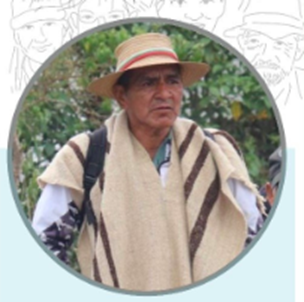
Photo obtained from: INDEPAZ via X
Tiberio Chepe Zeti was a traditional medicine practitioner and Nasa leader that worked for the defense of natural resources and for the rights of the Nasa People in the territory of Kwe'sx Yu Kiwe. He was murdered on July 23, 2023 in the township of San Francisco, El Llanito, municipality of Florida, Valle de Cauca. Those responsible for his death were not identified, however, according to testimonies from people from that region, there had been previous intimidations towards the community elders and, specifically, Chepe has been expressly referred to as a “guerrillero lambón.”
The perpetrators have not been identified. A few days after the murder, the civil and military authorities revealed the creation of an extraordinary security council and along with this, they informed that they would offer a reward of 50 million pesos to anyone who shared useful information to identify those responsible for the murder. To this day, the perpetrators have not been identified.
*Lambón is a colloquial word in Spanish used to describe someone that is an adulator or a tattletale.
- Yesid Pechené Musicué
-
Yesid Pechené Musicué from the Nasa People was killed on July 24, 2023 by a firearm attack. He was part of the Indigenous Guard and worked in the trading company called Plan de Vida Proyecto Nasa. The incident occurred in the Vichiquí trail, area of Loma Linda, Toribio, Cauca, while Pechené was heading home.
Mauricio Capaz, leader and Indigenous rights defender, denounced this incident and called on the Colombian State and international organizations to review the actions for the protection of leaders in the Cauca region. No information about the perpetrators was found.
- Fredy Alexánder Bomba Campo
-
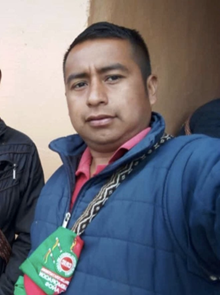
Photo: CRIC
Only 48 hours after the murder of Yesid Pechené Miscué, the Nasa leader Fredy Alexánder Bomba Campo was murdered on July 26, 2023 in the Nasa Kiwe Thek Ksxa’w territory, municipality of Santander de Quilichao, during a family gathering. The attack was perpetrated by three masked men. He was a counselor and an Indigenous authority of Pioya. He also served as president of the party Alternative Indigenous and Social Movement (Mais de Caldono).
The Ancestral Authorities of the Ancestral Territory of Sa’th Tama Kiwe issued a press statement condemning the incident. They also demanded their fundamental right to life be secured and requested an immediate ceasefire by criminal groups towards Indigenous leaders. They also stated that these systematic violent acts against their leaders and the community in general are part of a "strategy for the physical extermination of the Nasa People.''
To protest Alexánder’s murder and with the purpose of demanding justice, several Indigenous communities stood in front of the Hospital Francisco de Paula Santander, requesting that authorities accompany them and emphasizing the importance of family, community, and territory.
Alexánder had a security detail assigned by the National Unit of Protection but not even that was enough to protect him.
- Benito Segundo Castillo Gutiérrez
-

Photo obtained from: INDEPAZ via X
Benito Segundo Castillo Gutierrez was a leader of the Wayúu People in Maicao, La Guajira. He was also the President of the Cooperative AYATAWACOOP and served as the president of a cooperative focused on transportation. He was murdered on July 25, 2023, by armed men in the neighborhood Erica Beatriz, Maicao. Another person was injured in the same attack.
Castillo was known for his contributions to expand commercial exchanges with the communities of Paraguachón, located to the north of the border with Venezuela, and for his work in eliminating the stigma towards his People, who had been historically accused of being smugglers. Furthermore, he was a spokesman in the fight to legalize the importation of fuel from Venezuela to Colombia.
The NGO Nacion Wayuu condemned Castillo's murder and highlighted that “when an Indigenous Wayuu person is murdered, it is an attack towards an entire culture that fights and resists against ostracism and neglect by the rule of law.” Furthermore, they demanded justice for their leader and for other victims in the region.
- Eduardo Timaná
-

Photo obtained from: Renovación del territorio via Facebook
Eduardo Timana was a leader from the Nasa People. In the past he was the authority of the Kwet Wala Reservation in Pradera Valle. He was a law student at the Organization of Indigenous Councils of the North of Cauca (ACIN) school and supporter of the Indigenous Regional Council of the Cauca (CRIC) legal representation team in a case. He was murdered by gunmen in the area of Lomitas, on August 4, 2023. The attackers identified themselves as part of the groups Aguilas Negras and Nueva Marquetalia.
The Counseling Section of the Self Government of the Nasa People called the community to unite and rise together and stronger to fight for the defense of their territory and their lives. Also, they called on the authorities to protect their People. In response, the National Police offered a 50 million peso reward to anyone that could provide useful information to capture the attackers. Nevertheless, to date the names of the murderers remain unknown.
- Jose Arley Cruz Chocue
-
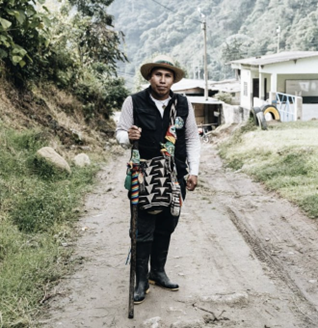
Photo obtained from: Centro Nacional de Memoria Histórica via X
Jose Arley Cruz Chocue was a leader and traditional authority of the Indigenous community of Granates, in the reservation of Kwe’sx Yu Kiwe located in Florida, Valle de Cauca. He was enrolled in the third semester of the “Revitalization of Mother Earth” Bachelor’s degree at the UAIIN (Autonomous Indigenous and Inter-cultural University). He was murdered on September 17, 2023 after being attacked with gunfire while riding his motorcycle in the village of Miranda. Jose had previously been threatened by armed illegal groups who would send him pamphlets.
After this, the Council of the Self-Government of the Nasa People in Valle del Cauca expressed their repudiation toward armed groups whose intention is to silence the voices of the leaders that defend the rights of the Peoples of the region. Furthermore, they requested protection for their leaders who have received threats of death.
Reports indicate that three leaders from the Kwe’sx Yu Kiwe reservation were murdered in less than two months.
- Milton Santacruz Aguilar
-
Milton Santacruz’s (Gunadule) lifeless body was found on September 21, 2023 in front of his residence in the Indigenous Reservation of Caiman Nuevo, in Uraba. According to President Gustavo Petro, Milton had organized various activities to increase the government's presence in the region, including the planning of a convention between Colombia and Panama that took place in his reservation.
Another issue that Milton had been involved in was humanitarian assistance for thousands of migrants that every day cross the border through the Darien Gap, on the border with Panama. As a result of communities and leaders advocating for this, the President of Colombia has met with the President of Panama on multiple occasions to discuss the situation of migrants.
Milton was the president of the Indigenous Organization of Antioquia between 1987 and 1990, and members of the organization expressed their sorrow upon this murder. “Milton will be fondly remembered as a calm man, a leader like no other and as a leader who fought relentlessly for the rights of the Indigenous Peoples of this country. We will mourn his death but we will always feel happy for the opportunity to meet him and for the time we shared with him.”
Milton used to say, “We, the Gunadules, sing and dance to avoid death.” His work as teacher, translator and defender of his territory prevails among his community and in every fight that he devoted his strength to.
- Cristóbal Nastacuas Nastacuas
-
Cristóbal Nastacuas Nastacuas, leader and member of the Indigenous Guard of the Nulpe Medio council, from the Awá community, died on November 9, 2023, after accidentally stepping on an antipersonnel mine in the municipality of Ricaurte.
Several Awá reservations are affected by the presence of antipersonnel mines planted by different illegal groups who fight over control for the land and, according to the regional Ombudsman’s office, up to that moment 42 people had been injured by mines.
Indigenous communities in the area have repeatedly denounced that the presence of this type of mine puts them at risk and prevents them from freely moving throughout their land and have asked the responsible entities to intervene to guarantee the protection of their inhabitants.
- Juan David Chávez Yoino
-
Juan David Chávez was 23 years old and was a member of the Indigenous Guard of the Nasa Juan Tama reservation in the municipality of La Plata, Huila. He was attacked by several armed men who killed him on November 2, 2023.
The Office of the Ombudsman has released several early warnings noting that the collective protection the Indigenous Guards carry out is at risk of being severely affected by the presence of armed groups in the area.
- Rogelio Chate Peña
-
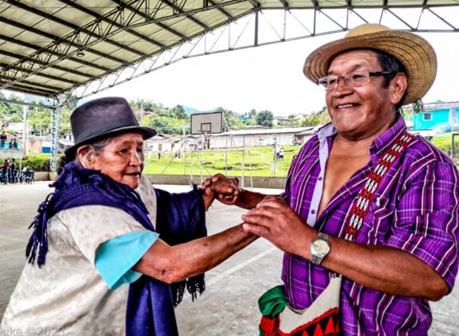
Photo: Consejo Indígena Regional del Cauca (CRIC)
Rogelio Chate was an elder of the Nasa People. Previously he had been a governor of the Indigenous Reserve of the Pueblo Nuevo and was a former council member of the Ukawes’x Nasa Cxab council association. He was first reported as missing, and his body was found on November 29 in the municipality of Santander de Quilichao, Cuaca.
The community denounced that at the time of Rogelio’s disappearance, an armed group known as Dagoberto Ramos, affiliated with FARC, was present in the area. The community leaders had asked them to leave the territory to avoid harm to the community.
According to CRIC, Rogelio was a “spiritual leader that transcended borders and left an unerasable footprint on the community.” They shared, “Although this news is sad, the spirit of Rogelio will still hover over the community, guiding us from the spiritual realm.”
- Phanor Guazaquillo Peña
-
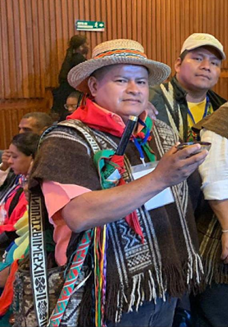
Photo: Facebook Organización Indígena de Antioquia
Phanor Guazaquillo was an Indigenous leader, governor of the Nasa council of Kwesx Kiwe Chorrolargo and former councilor of the Puerto Asís municipality. According to the Instituto de Estudios para el Desarrollo y la Paz (Indepaz), he was murdered by hitmen on November 3, 2023, while he was attending the funeral of another Indigenous leader in Putumayo.
Congressman William Aljure denounced that Phanor had already asked several entities for security measures, as he was receiving threats, but no protection was provided. The Nasa leader had participated in the drafting of the Ethnic Chapter of the Peace Accord with FARC.
The Indigenous Organization of Antioquia expressed, “As the Human Rights and Peace Council, the murder of our brother Phanor Guazaquillo from the Nasa people, who shared knowledge and led processes in the Antioquia department, makes us reject these assassinations, which leave not only one family sad but a whole community who had hoped to continue learning and building processes under the orientation of elder Phanor Guazaquillo.”
- Marino Paví Julicue
-
Marino was at his house in Toribío, Cauca on December 16, 2023, when a man arrived and, after an argument, shot him. Marino had been coordinator of the Indigenous Guard on his reservation and was a student of pedagogy of arts and ancestral knowledge of the Autonomous Indigenous Intercultural University. He was also a teacher of the Nasa Yuwe language.
The Indigenous Regional Council of Cauca denounced that in 2023 alone, three other students of that university had been killed and teachers had received threats.
The Association of Indigenous Councils of the North of Cauca (ACIN) released a statement lamenting the leader’s murder. They express their solidarity with the family and dery the message of terror these incidents impose on other students.
- John Freiman Ramos Ocaña, Yisel Menza, Jelen Charit Ramos Menza, Davinson Fernández Ramos and Jesús David Labio Ramos
-
John Freiman Ramon was killed together with his wife Yisel Menza and their 15 year old daughter Jelen Charit Ramos Menza the morning of December 22, 2023, on the Indigenous Reservation Canoas, Santander de Quilichao, Cauca. A few hours later, in the same territory, Davinson Fernández Ramos and Jesús David Labio Ramos were killed. The connection between both attacks has not been proven.
Authorities believe those responsible may be part of the FARC dissidents who are in that territory.
- Eliecer Puyo Chocué
-
Continuing with the escalating violence against Indigenous defenders in the department of Cauca, Eliecer Puyo Chocué was murdered on December 24, 2023, in El Pescador. Eliecer was part of the Indigenous Guard of the La Laguna Reservation.
Just between December 16 and 22, 2023, 17 homicides took place in Cauca. President Gustavo Petro said, “The violence in Cauca is the consequence of armed illegal organizations trying to take control over communities and social organizations. They take advantage of interethnic conflicts and the power of the economy.”
Ecuador
- Eduardo Mendúa
-
On February 26, 2023 Eduardo Mendúa (A'i Kofan) was shot and killed outside his home in the province of Sucumbíos in the Ecuadorian Amazon. Eduardo had just come from participating in a Council of CONAIE (Confederation of Indigenous Nationalities of Ecuador), an organization of which he was a member and leader of international relations. He was a well-known defender of the A'i Kofan people against the oil companies that exploit their territory.
This crime did not come out of the blue. The oil company Petroecuador plans to dig 30 wells in the territory of the A'i Cofán de Dureno community, ignoring the State's obligation to obtain the community's Free, Prior and Informed Consent. On February 27, a suspect was arrested. Eduardo was aware that a price had been placed on his head, which had been confirmed through the testimony that at least five people gave after his murder, and yet the State failed to take action to protect Eduardo's life. Eduardo's brother was murdered less than a year before Eduardo’s murder. Community members opposed to oil extraction have been asking for protection ever since, but their requests have been ignored. The community fears that violence will continue due to the conflict that the company has generated.
Towards the end of January 2023, Eduardo gave an interview to Cultural Survival where he emphasized the great need his community had for international solidarity at that point in the struggle: "We invite all the organizations that can join us because our struggle is not only to conserve the forest. The environmental crisis is affecting us and it is evident what is happening worldwide. To conserve the forest is to conserve the common good for all people."
Guatemala
- Nicolasa López and Victoria Méndez
-
Nicolasa Lopez Mendez (27 years old) and Victoria Mendez Augustin (18 years old) were assassinated by gunfire on May 6, 2023. Both were defenders of nature belonging to the Xinca community and members of CODECA, the Comité de Desarrollo Campesino a campesino and Indigenous organization as well as members of the political party Movimiento para la Liberación de los Pueblos (MLP). They were born in the village known as Camarón, San Martin Jilotepeque, Jalapa, Guatemala, and were women who had much life left to live in contribution to their communities.
Nicolasa and Victoria were activists who protested against the nationalization of electrical energy. At the time of their death, their community was harassed because they spent 18 months protesting what they considered to be high prices of the utility. The government has not investigated who was responsible for this crime. CODECA has denounced the act of violence and demanded an investigation.
- Noé Gómez Barrera
-
Noé Gomez Barrera was a leader from the Xinca People who was committed to organizing his community in favor of the defense of the territory and the environment. His assassination occurred on Saturday, October 28th, 2023 in the sector of the Caulote Jutiapa during a complicated political situation in Guatemala that began in the same year on October 2nd, when there was a national strike including blockades of the main highways that lasted approximately 30 days. The primary demand of these protests was the resignation of Attorney General Consuelo Porras; the head of the Special Prosecutor's Office Against Impunity, Rafael Curruchiche; and Judge Fredy Orellana for threatening the country's democracy by attempting to prevent Bernardo Arévalo, winner of the presidential elections, from rightfully taking office.
In this context, many sectors of the population spoke out, among them Indigenous leaders like 69-year-old Noé Gomez. He was part of the ancestral authorities of the Xinca Parliament and since 2002 had been a defender of the rights of his People in environmental and territorial defense issues. In the weeks prior to his assassination, he was doing organizational and relationship-building work to be part of these protests and raise his voice. However, the government used fear and repression as a weapon to silence the demands and that is how he was murdered. After hearing a loud gunshot, neighbors came out to try to help but they could not save him, as his injuries were too severe. The parliament of the Xinca People of Guatemala repudiates the incident and demands that this violent attack against one of its leaders be investigated.
Honduras
- Ricardo Arnaúl Montero
-
Ricardo Arnaúl Montero was a Garifuna leader from the community of Triunfo de la Cruz, Tela, Honduras. He was a member of the Committee for the Defense of the Land and member of the Honduran Black Fraternal Organization (OFRANEH in Spanish). He was a strong defender of the area of Rio Gama, which is a recovered community area nearby Secundino Torres after the land grab for the development of touristic projects. In the past, he and other members of the community reported that they were receiving death threats, and Montero was murdered on January 28, 2023. No information about the perpetrators of this crime was found.
OFRANEH reported that the State has not fulfilled its obligations related to the land remediation and ownership in their territories; the organization also demanded the State assume its legal responsibilities and perform due diligence in the case of this and other murders that have occurred in the community. Also, they affirmed that these criminal acts have taken place after the territory extension of the state of emergency in the village because this action deepens the problem by making defenders more vulnerable.
This is not the first time that these events happen in the community Triunfo de la Cruz. In July 2020, five men, four of them Garifuna, disappeared and until this day, the community has no information about their whereabouts.
The Garifuna community of Triunfo de la Cruz has precautionary measures from the Inter-American Commission of Human Rights since 2006 and by means of a decision in 2015, the Inter-American Court of Human Rights prompted the Honduran state to provide reparations to the Garifuna People and to restore their lands to them.
- Amilcar Vieda and Naún Ismael Chacón
-
On May 9, 2023, Amilcar Vieda, 45 years old, and Naun Ismael Chacon, 22 years old, were murdered. The incident took place in Las Brisas, in the San Francisco de Locomapa Tribe, department of Yoro in the northern part of Honduras. The two Tolupan Indigenous men were attacked with machine guns while they were riding a motorbike from the community of Las Minas to Amilcar’s home in the community of Buenos Aires; later, their bodies were incinerated.
Amilcar was in a highly dangerous situation since he was a defender of Indigenous lands and territories in his community against corporate stakeholders. He was a member of the Preventive Council of San Francisco Locomapa and he was also part of the political organizing process called Amplified Movement for Dignity and Justice (MADJ). Naun was from Colón and had been living in this Tribe for two years.
In a statement, MADJ manifested their utmost concern for the violence in their territory, since this was not the first time that Indigenous defenders from their community had been murdered. This violence has been ongoing in spite of the precautionary measures 416-13 issued in 2013 by the Inter-American Commission of Human Rights to 18 people and their families. MADJ also prompted State authorities to identify those responsible for this and other crimes.
The attacks towards members of the Tolupana de Yoro tribe took place amidst a territorial conflict against the violent looting of natural resources by big mining and lumber companies.
The United Nations High Commissioner for Human Rights issued a press statement on May 12, 2023, condemning these murders and prompted the authorities to “take the needed actions so leaders, defenders and every person in the Tolupan tribe can work in a safe environment.” Nevertheless, the community is still facing violence and, given the constant threats, the Inter-American Commission recently extended the precautionary measures to protect 61 more people.
- Martín Morales Martínez
-
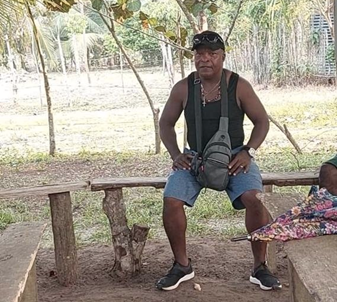
Photo obtained from: FLD Américas via X
Martín Morales Martínez was a Garifuna community leader and a human rights defender from Triunfo de la Cruz. He was a member of the Committee for Land Defense (CODETT) in his community and he was also part of the committee and the commission for the execution of the decision issued by the Inter-American Court of Human Rights in 2015 declaring the Honduran State responsible for the violation to the right of collective property for failing to comply with its obligation to delimit and demarcate titled lands.
He was reported missing on May 27, 2023, and one day later his body was found in the Gama River, territory of Secundino Torres. Other community members and Martín himself had previously reported to the national authorities the attacks and death threats that he had been receiving. Both the Inter-American Court and other international entities believe that the increasing violence is caused by the community's claims about their lands, which had been invaded by public and private actors.
The OFRANEH and the Civic Council of Popular and Indigenous Organizations of Honduras (COPINH) reported Martín’s murder and demanded that a thorough investigation be performed to find and prosecute the perpetrators.
- Juana María Martínez
-
The body of Juana María Martínez (Pech) was found dead on September 23, 2023 along with that of another person, believed to be her partner, in the community of Pueblo Nuevo Subirana in Dulce Nombre de Culmí. Both had gone out to harvest beans and were shot and burnt by unknown individuals.
Juana María was an active person in her community. She worked with women and actively participated in the Indigenous assemblies of the Pech People.
Mexico
Global Witness reported that Latin America, particularly Mexico, saw the highest number of environmental defenders killed in 2021, with Mexico recording 54 cases, surpassing Colombia and Brazil. The majority of attacks in Mexico were linked to land and mining conflicts, notably in Oaxaca and Sonora. Oaxaca was identified as the most lethal state for environmental activists, recording 18 cases. Overall, Mexico has become one of the most dangerous countries for environmental defenders in the past decade, with 154 recorded murders between 2012 and 2021, most occurring between 2017 and 2021.
- Remigio de la Cruz López
-
We honor the legacy of Remigio de la Cruz López (48 years old) with the Amuzga community. Remigio was a member of the National Coordinating Committee of the Amuzga Nation made up of five municipalities: Xochistlahuaca, Tlacoachistlahuaca and Ometepec in Guerrero and San Pedro Amuzgos and Santa María Ipala in Oaxaca. Remigio was murdered on January 1, 2023, in the Indigenous community of Zacualpan, municipality of Ometepec, Guerrero. It is not clear what happened, but the police believes that he was shot to death as he was leaving a family dinner as he was left lying a few meters from his home.
The struggle of this Indigenous community is related to the recovery of their lands. In the geographical area where the Amuzgo community is located, there are caciques (local chiefs coming from landowning families and related to organized crime) who have gunmen to defend their bosses’ land, which was at one time part of the communal patrimony of the Amuzgo Indigenous People. According to Tlachinollan, a well established organization in Guerrero, Remigio was killed because of the struggle against the cacique practices that have subjugated the Indigenous population. The local caciques have set themselves up as organized crime bosses and the people who know the most about the crime are afraid to speak out.
- Isaul Nemesio Zambrano, Miguel Estrada Reyes and Rolando Magno Zambrano
-
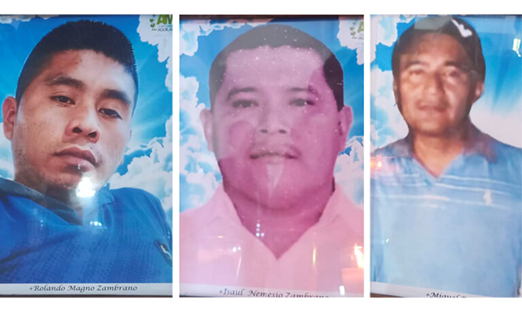
Photo via Facebook Comunicación Ostula
On January 13, 2023, three Community Guard members from the Nahua community of Santa María Ostula, located on the Michoacán coast, were murdered after an attack by the Jalisco Nueva Generación Cartel (CJNG). While at a surveillance point near the municipal seat of Aquila, Rolando Magno Zambrano,from Palma de Oro, Isaul Nemesio Zambrano, from Xayakalan, and Miguel Estrada Reyes, from La Cobanera, were murdered by a commando of “approximately 20 hitmen from the cartel CJNG.”
Rolando, Isaul, and Miguel were all prominent community leaders as members of the Ostula Communal Guard, protecting the surrounding population from violence by the CJNG. In a Facebook post by Comunicación Ostula, the community stated that due to the efforts of the Community Guards “in Santa María Ostula and the part of the municipality of Aquila with the presence of Community Guards, a climate of peace is in the air.”
“Our community is in mourning, deeply affected, and accompanying the pain of the families of our murdered comrades for having dared to defend the life and integrity of the Community with heroic dignity and courage, for having sought peace and security in the municipality and in the region,” the Nahua community of Santa María Ostula said in a statement.
- Alfredo Cisneros
-
Alfredo Cisneros (Purépecha), the head of communal property in the Purépecha village of Zicuicho, Michoacán, was fatally shot on February 21, 2023, while he was traveling home. In response, his neighbors blocked roads to demand a thorough investigation by the Attorney General's Office (FGE).
Alfredo, a tireless defender of Purépecha forests, had recently exposed illegal logging and changes in land use to plant avocado trees. The Supreme Indigenous Council of Michoacán (CSIM) highlighted that approximately 60 murders or disappearances of social activists, forest defenders, and Indigenous authorities have taken place in Michoacán over the last two decades.
- Eustacio Alcalá
-

Photo via Centro PRODH
Eustacio Alcalá was a Nahua environmental activist in the community of San Juan, Huitzontla in Michoacán. He was reported missing on April 1, 2023, while traveling by land to the community of Aquila. Two days later, on April 3, he was found dead in a rural area. His murder took place in a context in which insecurity has been escalating on the border between the states of Michoacán and Colima, a region where criminal organizations operate in partnership with the local or state governments.
Eustacio had been defending his community's territory from the illegal plundering of iron ore since 2012. He also filed a writ of amparo against the granting of mining concessions in his territory without prior, free and informed consultation. The verdict was in favor and the concession was canceled in 2022.
Human rights organizations and the Office of the United Nations High Commissioner for Human Rights in Mexico urged the state and federal government, as well as the Michoacán Attorney General's Office, to investigate Eustacio’s murder and ensure security conditions in the territory.
- Félix Vicente Cruz
-
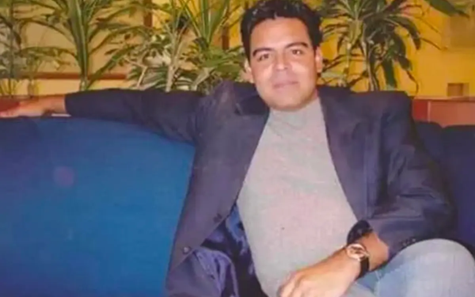
Foto vía EDUCA
Felix Vicente Cruz, a Zapotec defender, was from the community of 20 de Noviembre (El Morro) in San Francisco Ixhuatán, Oaxaca. He studied performing arts and worked as an actor in Mexico City, after which he returned and began to be known for his work on behalf of his community. He began to get involved in politics and was later elected as a policeman, focusing mainly on social activism in favor of the environment (defense of life and territory).
On Thursday, April 13, he was murdered at approximately 7:00 p.m. by individuals on a motorcycle. After shooting him multiple times they fled without leaving a trace. Elliot Escobar, friend and leader of the organization Sol Rojo, recognized Felix's legacy and said, "He was a comrade, cheerful, a fighter and a worker." The Isthmus Peoples’ Assembly in Defense of Land (Asamblea de Pueblos del Istmo en Defensa de la Tierra y el Territorio) believes this murder was caused by his opposition to the installation of mega projects in San Francisco Ixhuatán. These events occurred in the context of the imposition of the interoceanic corridor.
- Gertrudis Cruz de Jesús y Cliserina Cruz Merino
-
Gertrudis Cruz de Jesús and Cliserina Cruz Merino, from the Triqui People, were murdered on June 15, 2023, in the area of El Hongo, Yosoyuxi, while they were heading towards Tierra Blanca, Copala, Oaxaca, in a vehicle owned by the State Prosecutor. It is believed that they were in that car because of the insecurity in that area. Both women were part of the Unification Movement of the Triqui Struggle (MULT in Spanish) and they had previously reported threats which they received during a protest in Mexico City that was suppressed by police forces.
A year ago, Gertrudis’ brother, Mariano Cruz de Jesús, was murdered. These cases add to a long list of members of the MULT organization who have been murdered. Other human rights organizations have reported that the government has taken no action to alleviate the violence that this group faces. Instead, the State has sent in the National Guard as a strategy to protect the community, but due to the militarization context in the country, this puts Indigenous communities in a greater risk as there have been human rights violations by the armed forces in the past.
A political conflict has existed for the past 20 years where the Independent Unification Movement of the Triqui Fight (MULTI) and the MULT have fought against each other for the control of the lands of Tierra Blanca Copala, causing the forced displacement of over 500 people. Both groups signed an agreement of no aggression in 2022; however the mutual aggressions have persisted. The spokesperson from MULT, Pascual de Jesus Gonzales, attributed this and past attacks to other members of the community to MULTI, since both victims were ambushed in the MULTI territory.
MULTI denied responsibility for the attacks. The leader, Macario Garcia Merino, reiterated the unstable conditions in the region and highlighted that every time the return of the displaced families has been planned, a violent event takes place. Unfortunately, the authorities have not been able to identify who were the authors of this crime.
- Noel López Gallegos
-
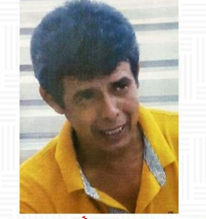
Photo: Oaxaca’s Prosecutor’s Office via AnimalPolítico
Noel López Gallegos was a Zapotec activist who worked for the defense of the territory of Santa Maria Mixtequilla, Oaxaca. On July 3, 2023, he was reported missing and his body was found on July 4.
He was part of the Pacific Civil Resistance of Santa Maria Mixtequilla and had questioned the creation of the industrial project “Development Pole for Wellbeing,” which is part of the Interoceanic Corridor of the Isthmus of Tehuantepec. He specifically questioned and was opposed to the payment of 130 million Mexican pesos to the title holders of lands for selling their lands to develop an industrial project in the region. He and some of his peers requested that the resources be distributed among all citizens who live in this municipality, and not only the communal land possessors.
No information about the perpetrators of Noel’s murder was found.
- Lorenzo Froylan de la Cruz Ríos
-
Lorenzo de la Cruz Rios, 20, was reported missing on August 1, 2023, when a commando linked to the Cartel Jalisco Nueva Generación (CJNG) kidnapped him. His community held demonstrations on August 9 to demand Lorenzo be returned alive, however, his body was found on August 11, 2023.
Lorenzo was a member of the Santa María Ostula Communal Guard. His community demanded that the crime be properly investigated and that the Prosecutor General’s Office hold the perpetrators accountable and dismantle the CJNG. In a statement on Facebook they denounced the collusion of several authorities, including the Michoacán Prosecutor’s Office and the National Guard, with the CJNG.
On January 13, 2023, three other members of the Santa María Ostula Communal Guard had been killed (see profiles of Isaul Nemesio Zambrano, Miguel Estrada Reyes and Rolando Magno Zambrano above).
- Higinio Trinidad de la Cruz
-
On November 24, 2023, Higinio Trinidad de la Cruz disappeared while on his way to a meeting with the municipal president of Cuautitlán de García Barragán, in Jalisco. His body was found a day later in the Sierra de Manantlán.
Higinio was a strong advocate of the Nahua People's lands against logging and mining. Communities in the area were already receiving threats for organizing from the Cartel Jalisco Nueva Generación (CJNG) and several Ayotitlán community defenders, including Higinio, were already beneficiaries of government protection. Higinio had already been kidnapped by criminal organizations in 2022 and questioned for his opposition to mining.
Higinio's murder is not the first to take place in the ejido of Ayotitlán, where on the eve of elections in 2021 Isaac Chávez, a candidate representing opposition to mining and logging was murdered.
Nicaragua
- Jesmin Jacobo Lázaro, Lenín Vilchez Patrón Flores, Alberto Castillo Palacio, Jorge Enor Palacio Samuel y Morgan Díaz Palacio
-
On Saturday, March 11, 2023, Jesmin Jacobo Lázaro, Lenín Vilchez Patrón Flores, Alberto Castillo Palacio, Jorge Enor Palacio Samuel and Morgan Díaz Palacio, five Mayangna land defenders, were shot and killed by a group of at least 60 colonos (land invaders). The events happened in the early morning hours in the Wilú community, one of the 24 communities comprising the Mayangnas Territory of Sauni Bas, in the heart of the Bosawás Biosphere Reserve, in the Autonomous Region of the Northern Caribbean Coast of Nicaragua. After the killings, the invaders went on and burned down several houses, sparing only the church, the parsonage and the school. Frightened, the rest of the community was forced to flee and seek help in the neighboring communities.
The area is not new to these conflicts: the Mayangna authorities report the killing of land defenders since 1979, when the conflicts for the land intensified. Moreover, the Wilú community had been targeted by another attack already in 2017, and the settlers have been trying to push back the Mayangnas for many years. In light of the clashes, the Inter-American Commission on Human Rights issued precautionary measures in February 2022 aiming at protecting three different communities which have been ignored by the Nicaraguan government.
The recent conflicts happen in a context of violence in spite of the passing of Law N.445, whose main purposes are to recognize Indigenous communities’ rights regarding use of their lands, property rights related to the natural resources, and the self-governance of their communities throughout their ancestral authorities.
Despite the frequency and scale of this violence, the Nicaraguan government has not addressed the issue and protected the Indigenous communities.
- Bernabé Palacios Hernández
-
On Monday, April 24, 2023, Bernabé Palacios Hernández (Mayangna), member and spiritual leader of the Alal community in the Mayangna Territory of Sauni As in the North Caribe Coast of Nicaragua, was assassinated by a group of settlers. It happened in the morning when, together with his son and his wife, the 44-year-old man was going to collect some food from the plot of land that his family cultivated in the Kikulanh area. The settlers ambushed and killed him, while his family managed to flee and survive.
Bernabé was part of the team of foresters that work to safeguard the area of the Bosawás Biosphere Reserve and fell victim to the long-lasting conflict in which settlers are constantly trying to push back the Indigenous communities in order to take their lands. Unfortunately, neither the region nor the Mayangna Peoples are new to this kind of violence: in the very same community, in January of 2020, four members were attacked and killed by another group of armed settlers. On this occasion, many other people were injured and houses were burned to the ground.
Bernabé’s murder will also sadly be affected by the high impunity rate that characterizes the perpetrators of these crimes. This is denounced by the very same members of the communities who, also right after Bernabés murder, received a visit by Oscar Alemán, regional head of the police, promising further investigation. However, these processes are usually very slow and the state often does not follow through with tracking down the perpetrators.
Many international organizations have urged the Nicaraguan government to accomplish its duty and protect these communities, as they are clearly the constant target of these crimes.
Paraguay
- Arnaldo Benítez Vargas
-
On October 22, 2023, Arnaldo Benítez Vargas (Paĩ Tavyterã), a spiritual leader (tekoaruvicha) of the Yvy Pyte community, was attacked amid the conflict over ancestral territories and ongoing genocide against the Paĩ Tavyterã Peoples in Paraguay.
Yvy Pyte leaders have been reporting threats and attacks by illegal invaders in their territories since 2021, seeking a resolution to protect their community from threats, land grabs, forced displacement, and destruction of their sustenance. If not resolved, the conflict may result in more deaths and harm to the community.
The Guarani Paĩ Tavyterã Peoples have been in the middle of a confrontation where their rights have been systematically violated by the army, the People’s Army of Paraguay (EPP), and other illegal actors.
Arnaldo Benítez Vargas’ murder comes painfully after a year in which two other Paĩ Tavyterã leaders, Alcides Morilla Romero and Rodrigo Gómez González, were murdered in October 2022.
Peru
- Santiago Contoricón Antúnez
-
On April 8, 2023, Santiago Contoricón Antúnez, Asháninka leader and intercultural teacher who was 58 years old, was shot in front of his family in his house in the Puerto Ocopa community, Junín. Santiago was a well-known leader who had had several roles in recent decades, among them being his membership in the Self Defense Committee of Puerto Ocopa.
The Central Asháninka del Río Tambo (CART) asserted that those responsible for the crime were groups related to drug trafficking since Santiago collaborated with the authorities in the seizure of drugs. The CART had requested protection from the State to be able to carry out these operations without facing so many risks but they were ignored, which has resulted in the murder of Santiago.
At the end of June 2023, the Supraprovincial Criminal Prosecutor's Office Specialized in Human Rights and Interculturality ordered pre-trial detention for a hitman named Ronal Pozo Huamán for being the alleged accomplice of the perpetrator of the crime; however, more solid progress is still missing in the investigation.
- Quinto Inuma Alvarado
-
On November 29, 2023, Quinto Inuma Alvarado (Kichwa) was killed while on his way back to his community after attending an event for environmental defenders in Pucallpa.
Quinto was a defender of the community of Santa Rosillo de Yanayacu, Huimbayoc district and had been fighting for years to protect the forests of his community, one of his objectives being the communal titling of lands threatened by the presence of drug trafficking and illegal logging.
Quinto had advocated with several institutions both nationally and internationally, even reaching the Inter-American Court of Human Rights. He had managed to get the Protocol for the Protection of Human Rights Defenders of the Ministry of Justice to activate an early warning; however, some measures were not effective and his murder shows the protection that this type of mechanism is able to offer to defenders is not always sufficient.
- Benjamín Flores Ríos
-
On December 17, 2023, Benjamín Flores (Kakataibo) was murdered in his home in the community of Mariscal Cáceres, Province of Padre Abad, Ucayali region. In a statement, the Regional Organization of AIDESEP-Ucayali ORAU denounced that Benjamín had received threats a week prior from coca growers for his work in defense of the environment.
The Ministry of Justice established a platform for defenders in Ucayali; however, the threats do not cease and Benjamín's murder demonstrates its ineffectiveness. This is why the communities themselves have created a platform for Indigenous ancestral self-protection.
ORAU and the Native Federation of Kakataibo Communities (FENACOKA) pointed out the responsibility of the authorities for not providing effective protection for the leaders defending their territories and demanded that the perpetrators be prosecuted.
Indigenous Peoples face a perilous situation across Peru. On December 14, 2023, the Congress approved the modification of Law No. 29763, Forestry and Wildlife Law, which will promote large-scale deforestation of the Amazon and has been promoted by the country's business sectors and their interests in the exploitation of Indigenous territories.

